MGBBT1TEN: Tourism Environment, Stakeholders & UK Sustainability
VerifiedAdded on 2023/06/08
|8
|2585
|493
Essay
AI Summary
This essay examines the tourism environment and its stakeholders, focusing on sustainable tourism development, particularly in the UK. It analyses the concept of sustainable tourism, its principles, and the roles of various stakeholders in decision-making. The essay also investigates macro-environmental factors using PESTEL analysis and micro-environmental factors influencing tourism product demand. It concludes by emphasizing the importance of managing business sustainably, motivating stakeholders, and continuously analyzing the business environment for sustainable tourism in the UK. Desklib provides access to similar essays and study tools.
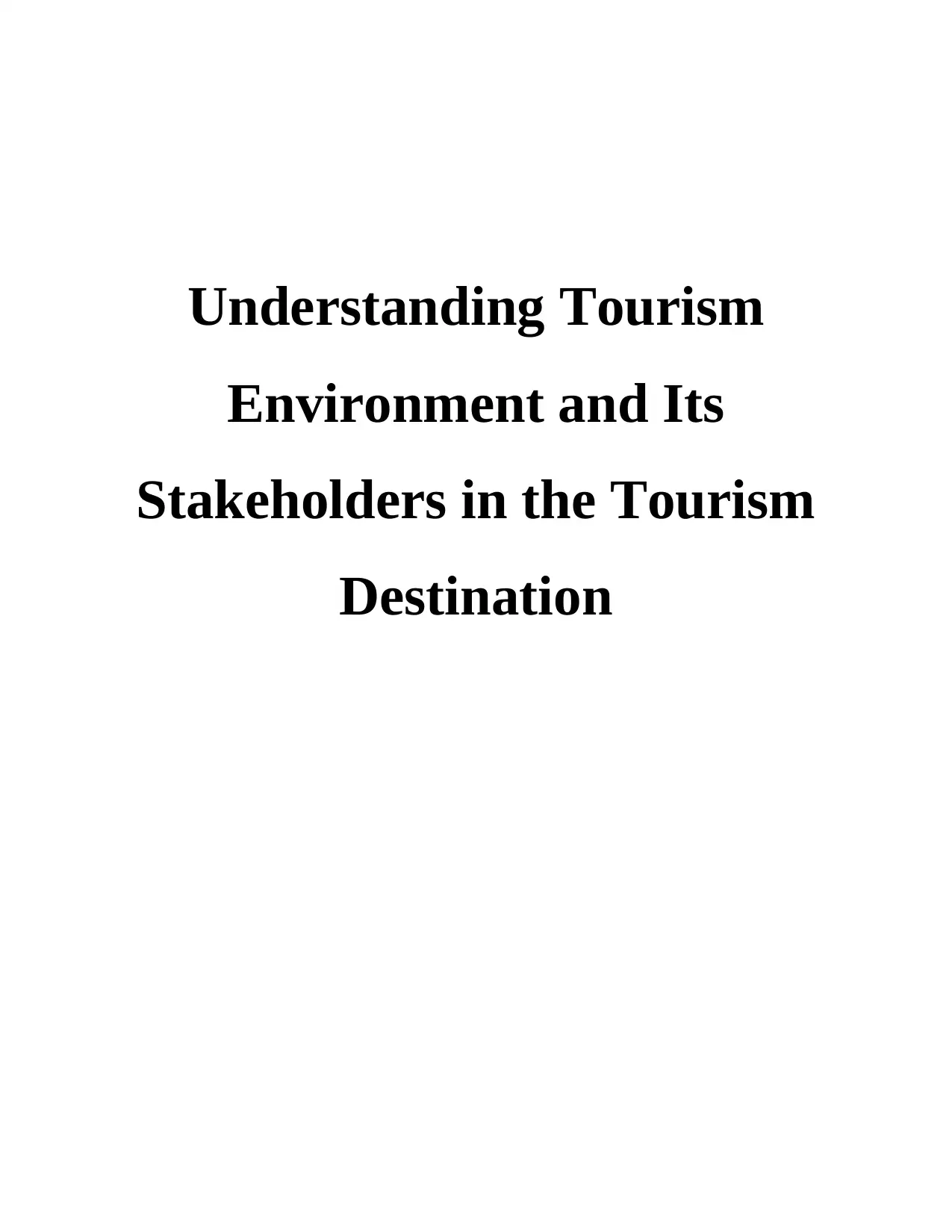
Understanding Tourism
Environment and Its
Stakeholders in the Tourism
Destination
Environment and Its
Stakeholders in the Tourism
Destination
Paraphrase This Document
Need a fresh take? Get an instant paraphrase of this document with our AI Paraphraser
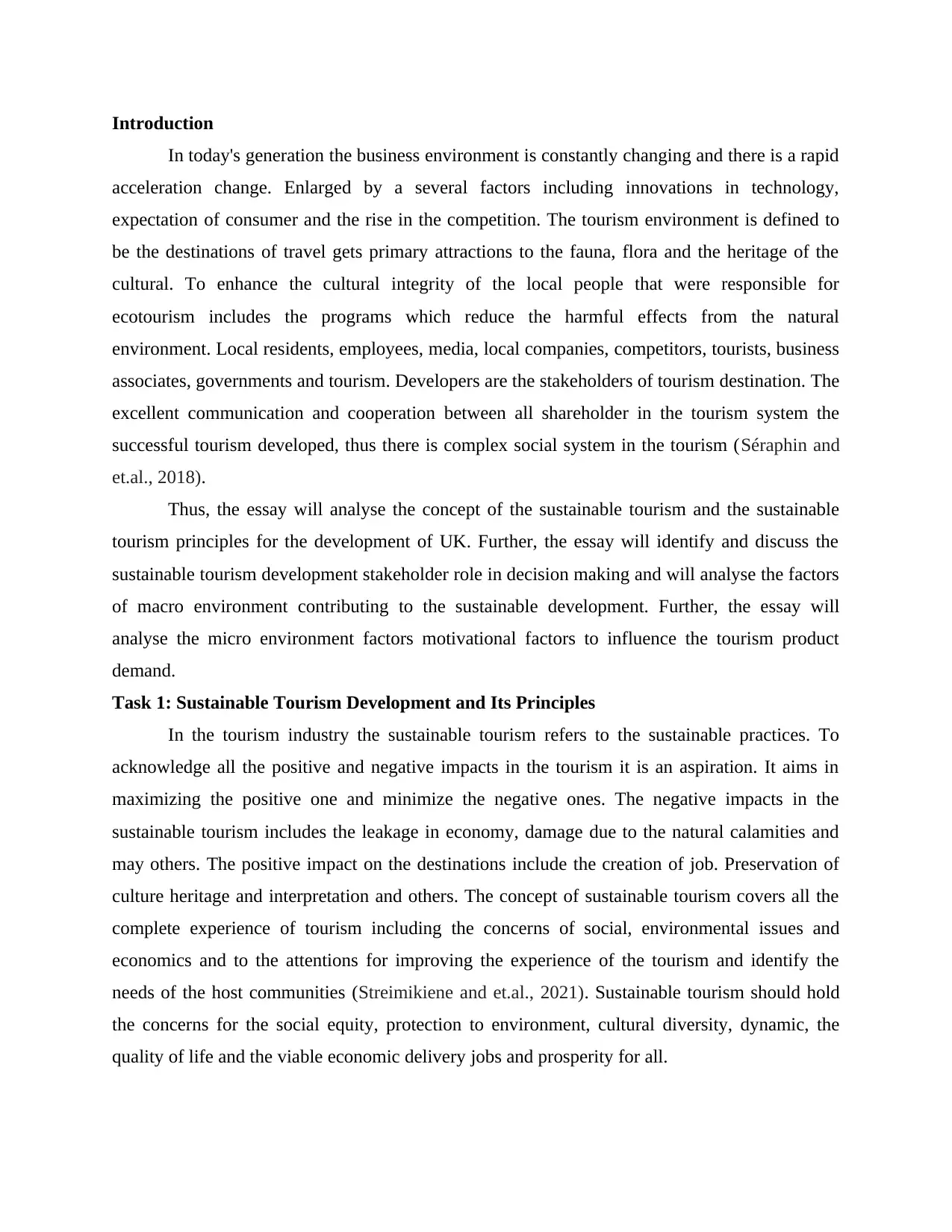
Introduction
In today's generation the business environment is constantly changing and there is a rapid
acceleration change. Enlarged by a several factors including innovations in technology,
expectation of consumer and the rise in the competition. The tourism environment is defined to
be the destinations of travel gets primary attractions to the fauna, flora and the heritage of the
cultural. To enhance the cultural integrity of the local people that were responsible for
ecotourism includes the programs which reduce the harmful effects from the natural
environment. Local residents, employees, media, local companies, competitors, tourists, business
associates, governments and tourism. Developers are the stakeholders of tourism destination. The
excellent communication and cooperation between all shareholder in the tourism system the
successful tourism developed, thus there is complex social system in the tourism (Séraphin and
et.al., 2018).
Thus, the essay will analyse the concept of the sustainable tourism and the sustainable
tourism principles for the development of UK. Further, the essay will identify and discuss the
sustainable tourism development stakeholder role in decision making and will analyse the factors
of macro environment contributing to the sustainable development. Further, the essay will
analyse the micro environment factors motivational factors to influence the tourism product
demand.
Task 1: Sustainable Tourism Development and Its Principles
In the tourism industry the sustainable tourism refers to the sustainable practices. To
acknowledge all the positive and negative impacts in the tourism it is an aspiration. It aims in
maximizing the positive one and minimize the negative ones. The negative impacts in the
sustainable tourism includes the leakage in economy, damage due to the natural calamities and
may others. The positive impact on the destinations include the creation of job. Preservation of
culture heritage and interpretation and others. The concept of sustainable tourism covers all the
complete experience of tourism including the concerns of social, environmental issues and
economics and to the attentions for improving the experience of the tourism and identify the
needs of the host communities (Streimikiene and et.al., 2021). Sustainable tourism should hold
the concerns for the social equity, protection to environment, cultural diversity, dynamic, the
quality of life and the viable economic delivery jobs and prosperity for all.
In today's generation the business environment is constantly changing and there is a rapid
acceleration change. Enlarged by a several factors including innovations in technology,
expectation of consumer and the rise in the competition. The tourism environment is defined to
be the destinations of travel gets primary attractions to the fauna, flora and the heritage of the
cultural. To enhance the cultural integrity of the local people that were responsible for
ecotourism includes the programs which reduce the harmful effects from the natural
environment. Local residents, employees, media, local companies, competitors, tourists, business
associates, governments and tourism. Developers are the stakeholders of tourism destination. The
excellent communication and cooperation between all shareholder in the tourism system the
successful tourism developed, thus there is complex social system in the tourism (Séraphin and
et.al., 2018).
Thus, the essay will analyse the concept of the sustainable tourism and the sustainable
tourism principles for the development of UK. Further, the essay will identify and discuss the
sustainable tourism development stakeholder role in decision making and will analyse the factors
of macro environment contributing to the sustainable development. Further, the essay will
analyse the micro environment factors motivational factors to influence the tourism product
demand.
Task 1: Sustainable Tourism Development and Its Principles
In the tourism industry the sustainable tourism refers to the sustainable practices. To
acknowledge all the positive and negative impacts in the tourism it is an aspiration. It aims in
maximizing the positive one and minimize the negative ones. The negative impacts in the
sustainable tourism includes the leakage in economy, damage due to the natural calamities and
may others. The positive impact on the destinations include the creation of job. Preservation of
culture heritage and interpretation and others. The concept of sustainable tourism covers all the
complete experience of tourism including the concerns of social, environmental issues and
economics and to the attentions for improving the experience of the tourism and identify the
needs of the host communities (Streimikiene and et.al., 2021). Sustainable tourism should hold
the concerns for the social equity, protection to environment, cultural diversity, dynamic, the
quality of life and the viable economic delivery jobs and prosperity for all.
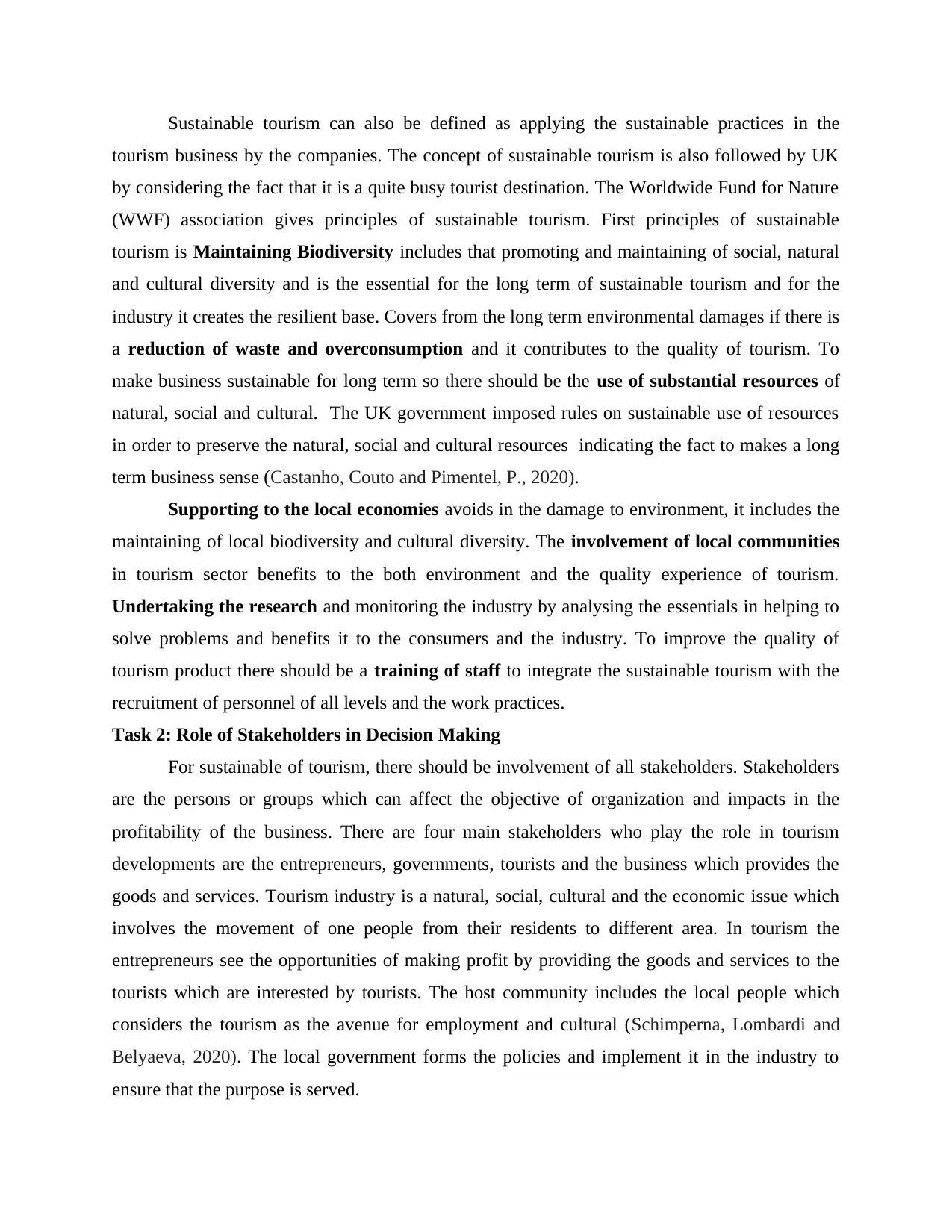
Sustainable tourism can also be defined as applying the sustainable practices in the
tourism business by the companies. The concept of sustainable tourism is also followed by UK
by considering the fact that it is a quite busy tourist destination. The Worldwide Fund for Nature
(WWF) association gives principles of sustainable tourism. First principles of sustainable
tourism is Maintaining Biodiversity includes that promoting and maintaining of social, natural
and cultural diversity and is the essential for the long term of sustainable tourism and for the
industry it creates the resilient base. Covers from the long term environmental damages if there is
a reduction of waste and overconsumption and it contributes to the quality of tourism. To
make business sustainable for long term so there should be the use of substantial resources of
natural, social and cultural. The UK government imposed rules on sustainable use of resources
in order to preserve the natural, social and cultural resources indicating the fact to makes a long
term business sense (Castanho, Couto and Pimentel, P., 2020).
Supporting to the local economies avoids in the damage to environment, it includes the
maintaining of local biodiversity and cultural diversity. The involvement of local communities
in tourism sector benefits to the both environment and the quality experience of tourism.
Undertaking the research and monitoring the industry by analysing the essentials in helping to
solve problems and benefits it to the consumers and the industry. To improve the quality of
tourism product there should be a training of staff to integrate the sustainable tourism with the
recruitment of personnel of all levels and the work practices.
Task 2: Role of Stakeholders in Decision Making
For sustainable of tourism, there should be involvement of all stakeholders. Stakeholders
are the persons or groups which can affect the objective of organization and impacts in the
profitability of the business. There are four main stakeholders who play the role in tourism
developments are the entrepreneurs, governments, tourists and the business which provides the
goods and services. Tourism industry is a natural, social, cultural and the economic issue which
involves the movement of one people from their residents to different area. In tourism the
entrepreneurs see the opportunities of making profit by providing the goods and services to the
tourists which are interested by tourists. The host community includes the local people which
considers the tourism as the avenue for employment and cultural (Schimperna, Lombardi and
Belyaeva, 2020). The local government forms the policies and implement it in the industry to
ensure that the purpose is served.
tourism business by the companies. The concept of sustainable tourism is also followed by UK
by considering the fact that it is a quite busy tourist destination. The Worldwide Fund for Nature
(WWF) association gives principles of sustainable tourism. First principles of sustainable
tourism is Maintaining Biodiversity includes that promoting and maintaining of social, natural
and cultural diversity and is the essential for the long term of sustainable tourism and for the
industry it creates the resilient base. Covers from the long term environmental damages if there is
a reduction of waste and overconsumption and it contributes to the quality of tourism. To
make business sustainable for long term so there should be the use of substantial resources of
natural, social and cultural. The UK government imposed rules on sustainable use of resources
in order to preserve the natural, social and cultural resources indicating the fact to makes a long
term business sense (Castanho, Couto and Pimentel, P., 2020).
Supporting to the local economies avoids in the damage to environment, it includes the
maintaining of local biodiversity and cultural diversity. The involvement of local communities
in tourism sector benefits to the both environment and the quality experience of tourism.
Undertaking the research and monitoring the industry by analysing the essentials in helping to
solve problems and benefits it to the consumers and the industry. To improve the quality of
tourism product there should be a training of staff to integrate the sustainable tourism with the
recruitment of personnel of all levels and the work practices.
Task 2: Role of Stakeholders in Decision Making
For sustainable of tourism, there should be involvement of all stakeholders. Stakeholders
are the persons or groups which can affect the objective of organization and impacts in the
profitability of the business. There are four main stakeholders who play the role in tourism
developments are the entrepreneurs, governments, tourists and the business which provides the
goods and services. Tourism industry is a natural, social, cultural and the economic issue which
involves the movement of one people from their residents to different area. In tourism the
entrepreneurs see the opportunities of making profit by providing the goods and services to the
tourists which are interested by tourists. The host community includes the local people which
considers the tourism as the avenue for employment and cultural (Schimperna, Lombardi and
Belyaeva, 2020). The local government forms the policies and implement it in the industry to
ensure that the purpose is served.
⊘ This is a preview!⊘
Do you want full access?
Subscribe today to unlock all pages.

Trusted by 1+ million students worldwide
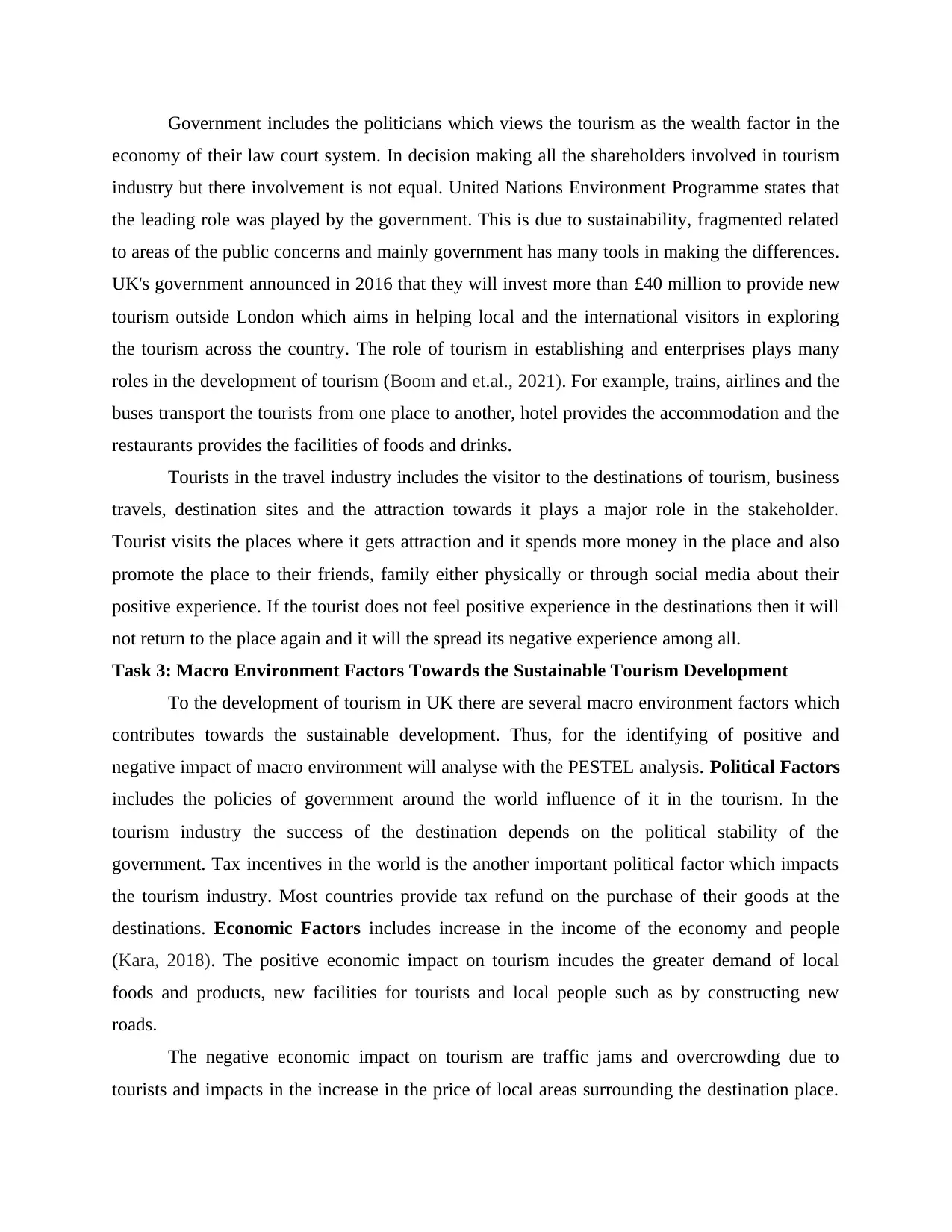
Government includes the politicians which views the tourism as the wealth factor in the
economy of their law court system. In decision making all the shareholders involved in tourism
industry but there involvement is not equal. United Nations Environment Programme states that
the leading role was played by the government. This is due to sustainability, fragmented related
to areas of the public concerns and mainly government has many tools in making the differences.
UK's government announced in 2016 that they will invest more than £40 million to provide new
tourism outside London which aims in helping local and the international visitors in exploring
the tourism across the country. The role of tourism in establishing and enterprises plays many
roles in the development of tourism (Boom and et.al., 2021). For example, trains, airlines and the
buses transport the tourists from one place to another, hotel provides the accommodation and the
restaurants provides the facilities of foods and drinks.
Tourists in the travel industry includes the visitor to the destinations of tourism, business
travels, destination sites and the attraction towards it plays a major role in the stakeholder.
Tourist visits the places where it gets attraction and it spends more money in the place and also
promote the place to their friends, family either physically or through social media about their
positive experience. If the tourist does not feel positive experience in the destinations then it will
not return to the place again and it will the spread its negative experience among all.
Task 3: Macro Environment Factors Towards the Sustainable Tourism Development
To the development of tourism in UK there are several macro environment factors which
contributes towards the sustainable development. Thus, for the identifying of positive and
negative impact of macro environment will analyse with the PESTEL analysis. Political Factors
includes the policies of government around the world influence of it in the tourism. In the
tourism industry the success of the destination depends on the political stability of the
government. Tax incentives in the world is the another important political factor which impacts
the tourism industry. Most countries provide tax refund on the purchase of their goods at the
destinations. Economic Factors includes increase in the income of the economy and people
(Kara, 2018). The positive economic impact on tourism incudes the greater demand of local
foods and products, new facilities for tourists and local people such as by constructing new
roads.
The negative economic impact on tourism are traffic jams and overcrowding due to
tourists and impacts in the increase in the price of local areas surrounding the destination place.
economy of their law court system. In decision making all the shareholders involved in tourism
industry but there involvement is not equal. United Nations Environment Programme states that
the leading role was played by the government. This is due to sustainability, fragmented related
to areas of the public concerns and mainly government has many tools in making the differences.
UK's government announced in 2016 that they will invest more than £40 million to provide new
tourism outside London which aims in helping local and the international visitors in exploring
the tourism across the country. The role of tourism in establishing and enterprises plays many
roles in the development of tourism (Boom and et.al., 2021). For example, trains, airlines and the
buses transport the tourists from one place to another, hotel provides the accommodation and the
restaurants provides the facilities of foods and drinks.
Tourists in the travel industry includes the visitor to the destinations of tourism, business
travels, destination sites and the attraction towards it plays a major role in the stakeholder.
Tourist visits the places where it gets attraction and it spends more money in the place and also
promote the place to their friends, family either physically or through social media about their
positive experience. If the tourist does not feel positive experience in the destinations then it will
not return to the place again and it will the spread its negative experience among all.
Task 3: Macro Environment Factors Towards the Sustainable Tourism Development
To the development of tourism in UK there are several macro environment factors which
contributes towards the sustainable development. Thus, for the identifying of positive and
negative impact of macro environment will analyse with the PESTEL analysis. Political Factors
includes the policies of government around the world influence of it in the tourism. In the
tourism industry the success of the destination depends on the political stability of the
government. Tax incentives in the world is the another important political factor which impacts
the tourism industry. Most countries provide tax refund on the purchase of their goods at the
destinations. Economic Factors includes increase in the income of the economy and people
(Kara, 2018). The positive economic impact on tourism incudes the greater demand of local
foods and products, new facilities for tourists and local people such as by constructing new
roads.
The negative economic impact on tourism are traffic jams and overcrowding due to
tourists and impacts in the increase in the price of local areas surrounding the destination place.
Paraphrase This Document
Need a fresh take? Get an instant paraphrase of this document with our AI Paraphraser
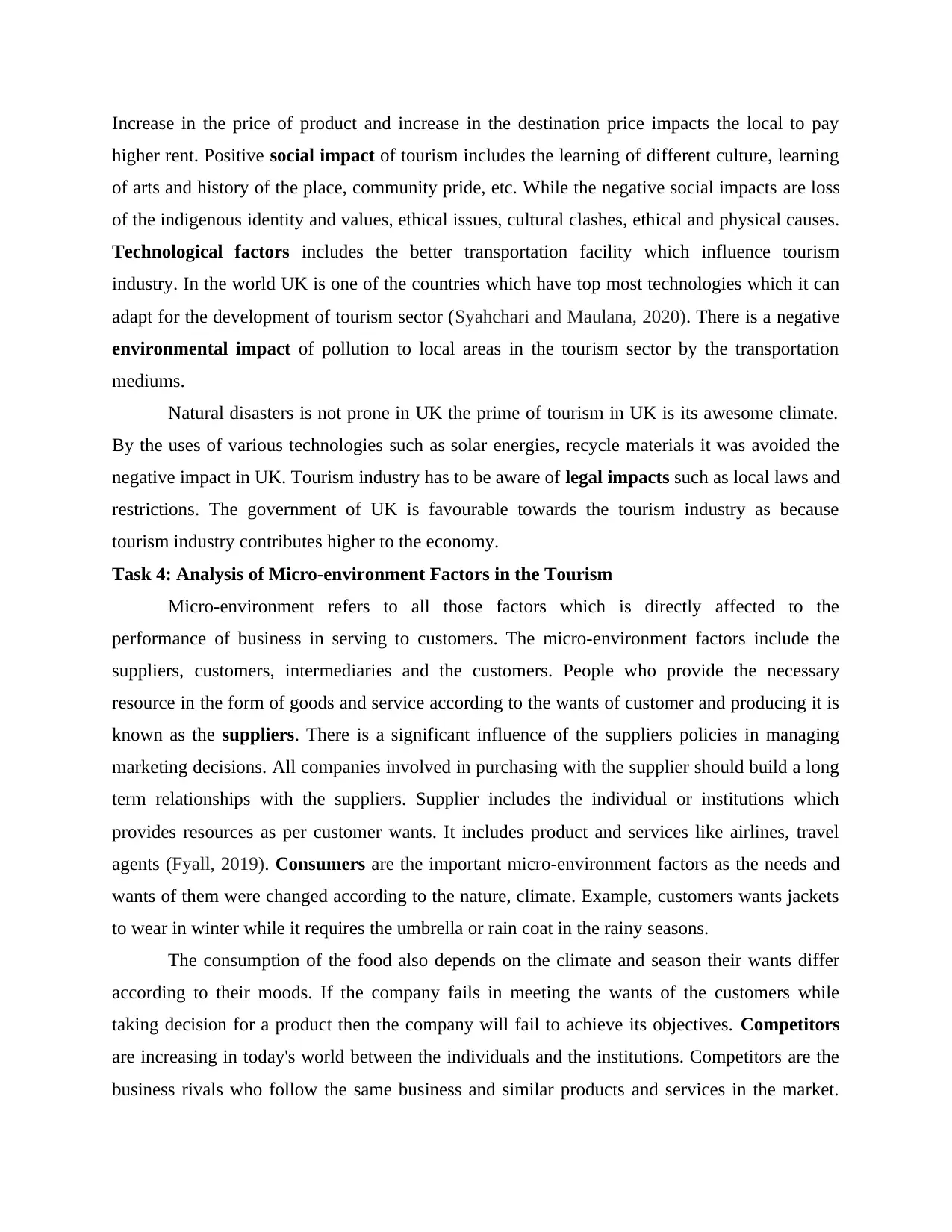
Increase in the price of product and increase in the destination price impacts the local to pay
higher rent. Positive social impact of tourism includes the learning of different culture, learning
of arts and history of the place, community pride, etc. While the negative social impacts are loss
of the indigenous identity and values, ethical issues, cultural clashes, ethical and physical causes.
Technological factors includes the better transportation facility which influence tourism
industry. In the world UK is one of the countries which have top most technologies which it can
adapt for the development of tourism sector (Syahchari and Maulana, 2020). There is a negative
environmental impact of pollution to local areas in the tourism sector by the transportation
mediums.
Natural disasters is not prone in UK the prime of tourism in UK is its awesome climate.
By the uses of various technologies such as solar energies, recycle materials it was avoided the
negative impact in UK. Tourism industry has to be aware of legal impacts such as local laws and
restrictions. The government of UK is favourable towards the tourism industry as because
tourism industry contributes higher to the economy.
Task 4: Analysis of Micro-environment Factors in the Tourism
Micro-environment refers to all those factors which is directly affected to the
performance of business in serving to customers. The micro-environment factors include the
suppliers, customers, intermediaries and the customers. People who provide the necessary
resource in the form of goods and service according to the wants of customer and producing it is
known as the suppliers. There is a significant influence of the suppliers policies in managing
marketing decisions. All companies involved in purchasing with the supplier should build a long
term relationships with the suppliers. Supplier includes the individual or institutions which
provides resources as per customer wants. It includes product and services like airlines, travel
agents (Fyall, 2019). Consumers are the important micro-environment factors as the needs and
wants of them were changed according to the nature, climate. Example, customers wants jackets
to wear in winter while it requires the umbrella or rain coat in the rainy seasons.
The consumption of the food also depends on the climate and season their wants differ
according to their moods. If the company fails in meeting the wants of the customers while
taking decision for a product then the company will fail to achieve its objectives. Competitors
are increasing in today's world between the individuals and the institutions. Competitors are the
business rivals who follow the same business and similar products and services in the market.
higher rent. Positive social impact of tourism includes the learning of different culture, learning
of arts and history of the place, community pride, etc. While the negative social impacts are loss
of the indigenous identity and values, ethical issues, cultural clashes, ethical and physical causes.
Technological factors includes the better transportation facility which influence tourism
industry. In the world UK is one of the countries which have top most technologies which it can
adapt for the development of tourism sector (Syahchari and Maulana, 2020). There is a negative
environmental impact of pollution to local areas in the tourism sector by the transportation
mediums.
Natural disasters is not prone in UK the prime of tourism in UK is its awesome climate.
By the uses of various technologies such as solar energies, recycle materials it was avoided the
negative impact in UK. Tourism industry has to be aware of legal impacts such as local laws and
restrictions. The government of UK is favourable towards the tourism industry as because
tourism industry contributes higher to the economy.
Task 4: Analysis of Micro-environment Factors in the Tourism
Micro-environment refers to all those factors which is directly affected to the
performance of business in serving to customers. The micro-environment factors include the
suppliers, customers, intermediaries and the customers. People who provide the necessary
resource in the form of goods and service according to the wants of customer and producing it is
known as the suppliers. There is a significant influence of the suppliers policies in managing
marketing decisions. All companies involved in purchasing with the supplier should build a long
term relationships with the suppliers. Supplier includes the individual or institutions which
provides resources as per customer wants. It includes product and services like airlines, travel
agents (Fyall, 2019). Consumers are the important micro-environment factors as the needs and
wants of them were changed according to the nature, climate. Example, customers wants jackets
to wear in winter while it requires the umbrella or rain coat in the rainy seasons.
The consumption of the food also depends on the climate and season their wants differ
according to their moods. If the company fails in meeting the wants of the customers while
taking decision for a product then the company will fail to achieve its objectives. Competitors
are increasing in today's world between the individuals and the institutions. Competitors are the
business rivals who follow the same business and similar products and services in the market.
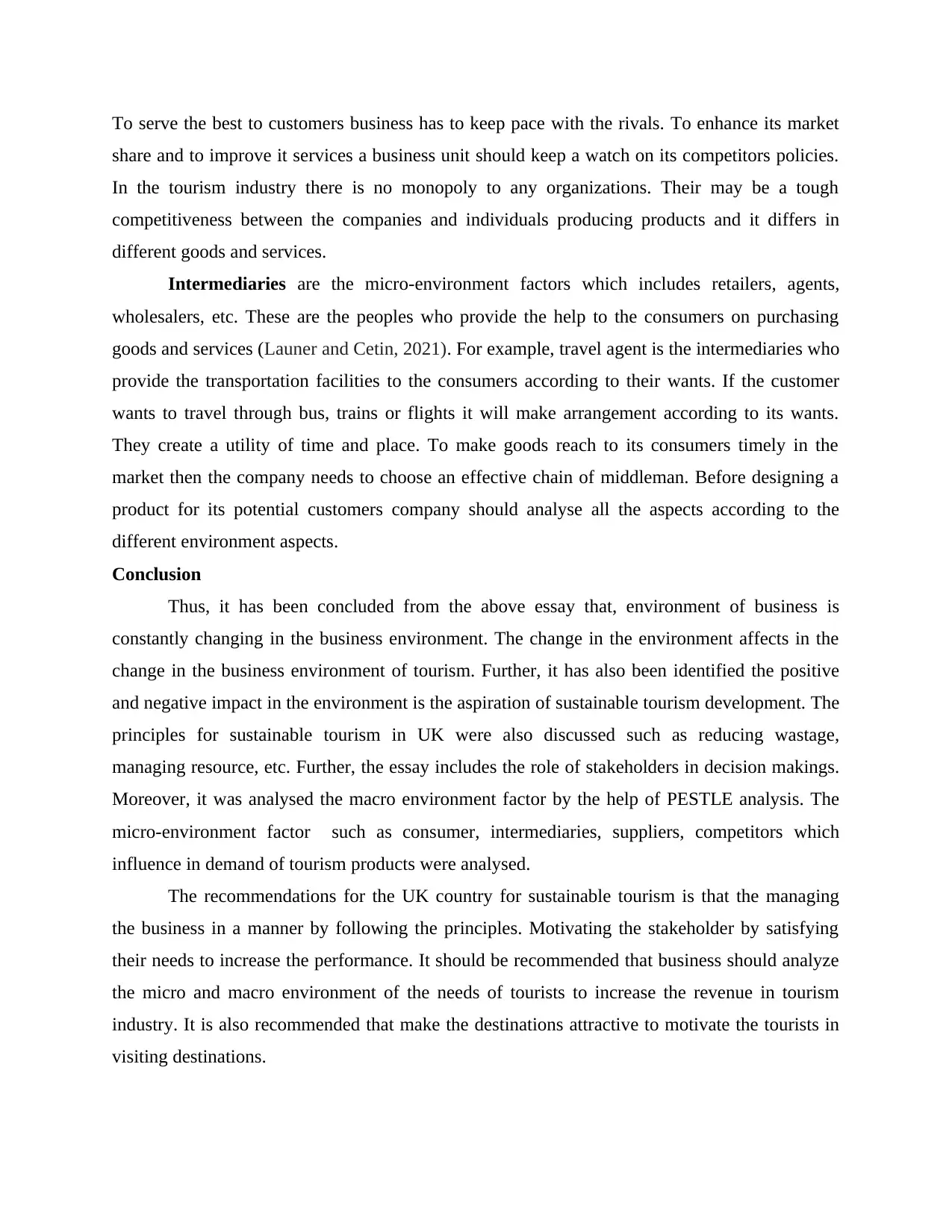
To serve the best to customers business has to keep pace with the rivals. To enhance its market
share and to improve it services a business unit should keep a watch on its competitors policies.
In the tourism industry there is no monopoly to any organizations. Their may be a tough
competitiveness between the companies and individuals producing products and it differs in
different goods and services.
Intermediaries are the micro-environment factors which includes retailers, agents,
wholesalers, etc. These are the peoples who provide the help to the consumers on purchasing
goods and services (Launer and Cetin, 2021). For example, travel agent is the intermediaries who
provide the transportation facilities to the consumers according to their wants. If the customer
wants to travel through bus, trains or flights it will make arrangement according to its wants.
They create a utility of time and place. To make goods reach to its consumers timely in the
market then the company needs to choose an effective chain of middleman. Before designing a
product for its potential customers company should analyse all the aspects according to the
different environment aspects.
Conclusion
Thus, it has been concluded from the above essay that, environment of business is
constantly changing in the business environment. The change in the environment affects in the
change in the business environment of tourism. Further, it has also been identified the positive
and negative impact in the environment is the aspiration of sustainable tourism development. The
principles for sustainable tourism in UK were also discussed such as reducing wastage,
managing resource, etc. Further, the essay includes the role of stakeholders in decision makings.
Moreover, it was analysed the macro environment factor by the help of PESTLE analysis. The
micro-environment factor such as consumer, intermediaries, suppliers, competitors which
influence in demand of tourism products were analysed.
The recommendations for the UK country for sustainable tourism is that the managing
the business in a manner by following the principles. Motivating the stakeholder by satisfying
their needs to increase the performance. It should be recommended that business should analyze
the micro and macro environment of the needs of tourists to increase the revenue in tourism
industry. It is also recommended that make the destinations attractive to motivate the tourists in
visiting destinations.
share and to improve it services a business unit should keep a watch on its competitors policies.
In the tourism industry there is no monopoly to any organizations. Their may be a tough
competitiveness between the companies and individuals producing products and it differs in
different goods and services.
Intermediaries are the micro-environment factors which includes retailers, agents,
wholesalers, etc. These are the peoples who provide the help to the consumers on purchasing
goods and services (Launer and Cetin, 2021). For example, travel agent is the intermediaries who
provide the transportation facilities to the consumers according to their wants. If the customer
wants to travel through bus, trains or flights it will make arrangement according to its wants.
They create a utility of time and place. To make goods reach to its consumers timely in the
market then the company needs to choose an effective chain of middleman. Before designing a
product for its potential customers company should analyse all the aspects according to the
different environment aspects.
Conclusion
Thus, it has been concluded from the above essay that, environment of business is
constantly changing in the business environment. The change in the environment affects in the
change in the business environment of tourism. Further, it has also been identified the positive
and negative impact in the environment is the aspiration of sustainable tourism development. The
principles for sustainable tourism in UK were also discussed such as reducing wastage,
managing resource, etc. Further, the essay includes the role of stakeholders in decision makings.
Moreover, it was analysed the macro environment factor by the help of PESTLE analysis. The
micro-environment factor such as consumer, intermediaries, suppliers, competitors which
influence in demand of tourism products were analysed.
The recommendations for the UK country for sustainable tourism is that the managing
the business in a manner by following the principles. Motivating the stakeholder by satisfying
their needs to increase the performance. It should be recommended that business should analyze
the micro and macro environment of the needs of tourists to increase the revenue in tourism
industry. It is also recommended that make the destinations attractive to motivate the tourists in
visiting destinations.
⊘ This is a preview!⊘
Do you want full access?
Subscribe today to unlock all pages.

Trusted by 1+ million students worldwide

Paraphrase This Document
Need a fresh take? Get an instant paraphrase of this document with our AI Paraphraser
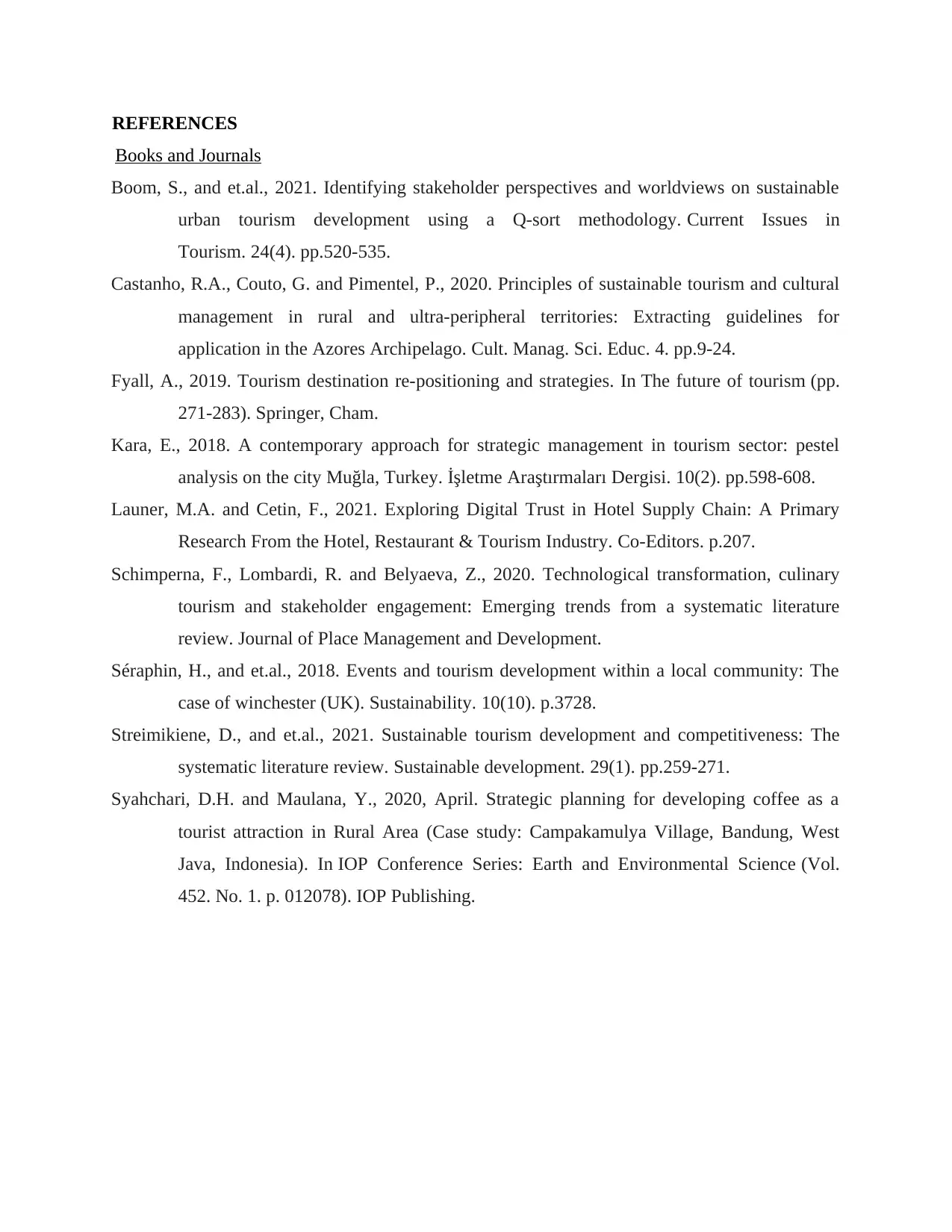
REFERENCES
Books and Journals
Boom, S., and et.al., 2021. Identifying stakeholder perspectives and worldviews on sustainable
urban tourism development using a Q-sort methodology. Current Issues in
Tourism. 24(4). pp.520-535.
Castanho, R.A., Couto, G. and Pimentel, P., 2020. Principles of sustainable tourism and cultural
management in rural and ultra-peripheral territories: Extracting guidelines for
application in the Azores Archipelago. Cult. Manag. Sci. Educ. 4. pp.9-24.
Fyall, A., 2019. Tourism destination re-positioning and strategies. In The future of tourism (pp.
271-283). Springer, Cham.
Kara, E., 2018. A contemporary approach for strategic management in tourism sector: pestel
analysis on the city Muğla, Turkey. İşletme Araştırmaları Dergisi. 10(2). pp.598-608.
Launer, M.A. and Cetin, F., 2021. Exploring Digital Trust in Hotel Supply Chain: A Primary
Research From the Hotel, Restaurant & Tourism Industry. Co-Editors. p.207.
Schimperna, F., Lombardi, R. and Belyaeva, Z., 2020. Technological transformation, culinary
tourism and stakeholder engagement: Emerging trends from a systematic literature
review. Journal of Place Management and Development.
Séraphin, H., and et.al., 2018. Events and tourism development within a local community: The
case of winchester (UK). Sustainability. 10(10). p.3728.
Streimikiene, D., and et.al., 2021. Sustainable tourism development and competitiveness: The
systematic literature review. Sustainable development. 29(1). pp.259-271.
Syahchari, D.H. and Maulana, Y., 2020, April. Strategic planning for developing coffee as a
tourist attraction in Rural Area (Case study: Campakamulya Village, Bandung, West
Java, Indonesia). In IOP Conference Series: Earth and Environmental Science (Vol.
452. No. 1. p. 012078). IOP Publishing.
Books and Journals
Boom, S., and et.al., 2021. Identifying stakeholder perspectives and worldviews on sustainable
urban tourism development using a Q-sort methodology. Current Issues in
Tourism. 24(4). pp.520-535.
Castanho, R.A., Couto, G. and Pimentel, P., 2020. Principles of sustainable tourism and cultural
management in rural and ultra-peripheral territories: Extracting guidelines for
application in the Azores Archipelago. Cult. Manag. Sci. Educ. 4. pp.9-24.
Fyall, A., 2019. Tourism destination re-positioning and strategies. In The future of tourism (pp.
271-283). Springer, Cham.
Kara, E., 2018. A contemporary approach for strategic management in tourism sector: pestel
analysis on the city Muğla, Turkey. İşletme Araştırmaları Dergisi. 10(2). pp.598-608.
Launer, M.A. and Cetin, F., 2021. Exploring Digital Trust in Hotel Supply Chain: A Primary
Research From the Hotel, Restaurant & Tourism Industry. Co-Editors. p.207.
Schimperna, F., Lombardi, R. and Belyaeva, Z., 2020. Technological transformation, culinary
tourism and stakeholder engagement: Emerging trends from a systematic literature
review. Journal of Place Management and Development.
Séraphin, H., and et.al., 2018. Events and tourism development within a local community: The
case of winchester (UK). Sustainability. 10(10). p.3728.
Streimikiene, D., and et.al., 2021. Sustainable tourism development and competitiveness: The
systematic literature review. Sustainable development. 29(1). pp.259-271.
Syahchari, D.H. and Maulana, Y., 2020, April. Strategic planning for developing coffee as a
tourist attraction in Rural Area (Case study: Campakamulya Village, Bandung, West
Java, Indonesia). In IOP Conference Series: Earth and Environmental Science (Vol.
452. No. 1. p. 012078). IOP Publishing.
1 out of 8
Related Documents
Your All-in-One AI-Powered Toolkit for Academic Success.
+13062052269
info@desklib.com
Available 24*7 on WhatsApp / Email
![[object Object]](/_next/static/media/star-bottom.7253800d.svg)
Unlock your academic potential
Copyright © 2020–2026 A2Z Services. All Rights Reserved. Developed and managed by ZUCOL.

